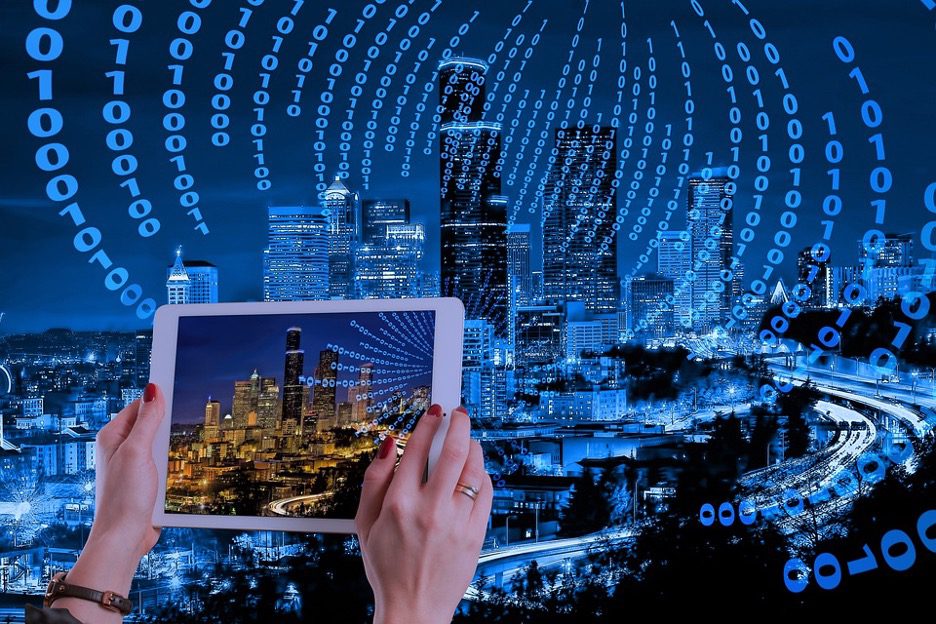
Click here to learn more about Gilad David Maayan.
Big data solutions provide administrative controls for large amounts of data, including storage, backups, analysis, and visualization. Big data systems introduce efficiency into a complex data infrastructure. In addition, big data solutions enable the use of advanced capabilities in smart cities. This includes Internet of Things (IoT) technology, smart sensors, smart transport, and more. This article reviews the basic concepts of a smart city and how big data impacts smart cities.
What is a Smart City?
A smart city uses sensors and connected devices to collect and analyze data. This data is used to optimize city operations, manage resources, and improve the everyday life of citizens. Smart cities utilize technology to improve access to public transport, manage traffic, optimize water and power supply, and improve law enforcement services, schools, hospitals, and more.
How Does a City Become Smart?

Smart cities have three fundamental layers of operations:
- Technological Layer: A large number of sensors and connected devices used to provide a wide range of services.
- Dedicated Applications: Information systems used by city officials and citizens to improve city operations.
- Application Usage: Implementation and usage of the applications inside the city by designated users.
The technological layer of a smart city includes:
- Internet of Things (IoT): Sensors and internet-connected devices can communicate with each other and send data to management systems. Smart cities use IoT to collect data and to actively solve problems.
- Information and Communication Technology (ICT): This platform is used to enable communication between citizens. Smart cities can use ICT to make changes to city services by analyzing data and feedback from citizens.
- Sensors: Sensors can collect different types of information, like light pressure, temperature, number of vehicles, and people.
Three examples of city activities that can be smart:
- Smart Transport: Improves traffic management through the use of navigation apps, smart cards, and signal control systems. Smart transport technologies notify travelers about traffic and other road conditions, guide drivers to available parking spots, and detect traffic accidents.
- Smart Water and Energy: Based on smart meters that gather data about energy and water demands and uses. This data enables cities to regulate supplies. For instance, to supply more water or energy to certain parts of the city that consume more resources.
- Smart Healthcare: Improves health treatment and diagnosis through technology and smart devices. For instance, smart sensors can detect air or water pollution before they turn into a public health risk. Sensors can also gather data from medical facilities and detect the spread of diseases.
How Big Data Impacts Smart Cities
Big data can have an impact on various sectors of a city, including transport, public safety, city budgets, and more.
Public Safety
Smart cities must provide security for their citizens. Cities can use predictive big data analytics to identify which areas are prone to be hubs of crime and predict the exact crime location. Information like historical and geographical data helps cities create a much safer environment.
Transportation
Traffic congestion is a major problem in many cities since it can cost cities millions in revenue. Cities can manage transportation by analyzing data from transport authorities. The analyzed data can uncover patterns that help reduce traffic congestion and help authorities implement data-driven road optimization.
Cost Reduction
Cities invest a lot of money in transforming a city into a smart city. These investments can be either for remodeling or renovation. Analysis of big data can suggest which areas require transformation and what kind of transformation. As a result, cities can make dedicated investments for required areas.
Sustainable Growth
Regular analysis of the growth of a smart city enables city officials to get continuous updates about needed changes. Continuous updates are the key growth drivers of sustainability because they provide a clear idea regarding the required developments. Data plays a key role in determining the outcomes of development in a smart city.
Where Smart Cities Store Their Data
Smart cities need a huge amount of archived and real-time data to function properly:
- Smart Cars Data: Autonomous and smart cars are becoming more integrated with mobile systems. As a result, cars can communicate with each other and with cities. This communication can reduce congestion, prevent road incidents, and improve navigation.
- Camera Systems Data: Camera surveillance can help with traffic enforcement, improve public safety, build intelligent lighting systems, and serve as a crime detector.
- Environmental Sensor Data: Air quality sensors enable cities to find and take action against polluters, locate green areas with low air quality, and provide air quality status alerts to citizens.
Smart cities can store their data in three main locations:
Cloud Storage
Smart cities require large amounts of data for analytical purposes. Cloud data systems use solid-state drives in their data centers, remove redundant data, and encrypt the transmission of data. Cloud-based solutions usually have more flexible payment options than on-premise data centers.
Edge Computing
Edge computing enables you to process data close to the source. Edge computing can be cheaper than streaming data to a remote storage location and then to relevant city authorities. Edge computing functionalities like artificial intelligence (AI) traffic management is already under development in some cities. AI traffic management makes use of intelligent automation to detect traffic congestion and accidents and provide faster response to different conditions.
Hybrid Data Storage
Hybrid data storage systems combine the benefits of cloud and edge storage. Hybrid data storage enables cities to make new decisions based on real-time alerts on conditions as well as rich data stores.
Conclusion
Big data plays an important role in a smart city. Cities can process data from IoT devices and sensors to recognize patterns and needs. The analysis can reduce the number of road accidents and congestion and help drivers find a parking spot. Data can also reduce crime, improve smart urban lighting, and improve water and energy systems.
